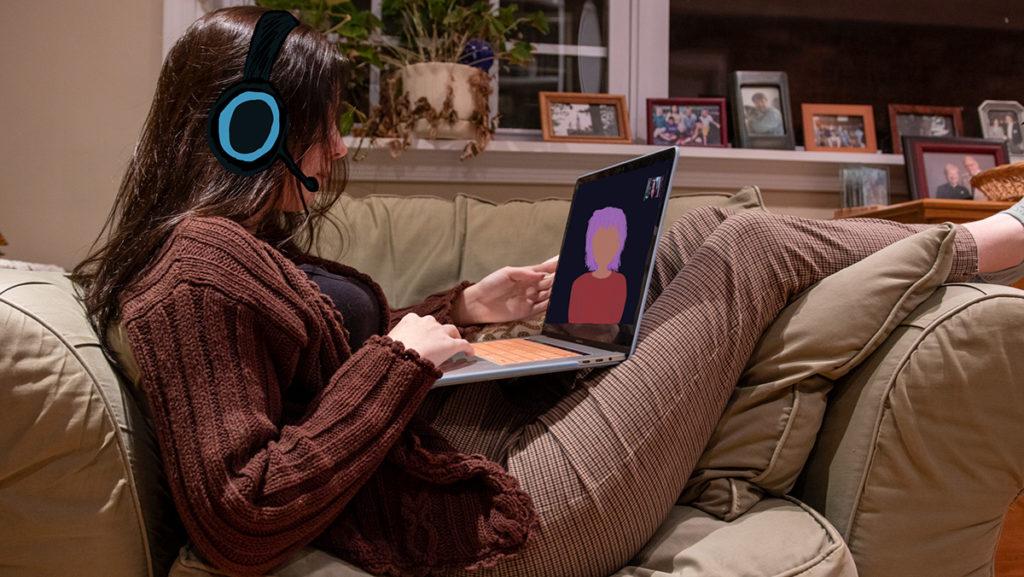Ithaca College junior Caroline Mannion said much of her “typical” college experience was warped by the COVID-19 pandemic. Adding generalized anxiety, depression and anorexia disorders, Mannion said, only made things more difficult.
Mannion said she has had many difficulties during Fall 2021 finding groups where she feels she belongs. Much of the friendships Mannion said she began to make during her freshman year were destroyed as a result of the pandemic cutting Spring 2020 short and not being able to see one another in person during Fall 2020, which was held remotely.
“That has taken a big hit on my mental health because [I wonder] is it just me who can’t find these friends?” Mannion said. “The March we left campus, I was starting to find friends and then we weren’t allowed back [on campus]. So that was really difficult … because I live in Ohio, and they all live in Massachusetts and New York.”
Mannion also said she struggles with juggling academics, her social life and her mental well-being. Part of the stress, Mannion said, comes from dealing with professors who expect her to perform academically at high productivity levels. She said it was unfair for professors to expect students to be put together despite continuing to deal with the effects of the pandemic.
“With mental health, even though in some cases it can be really hard to deal with, [people] keep going, like they have perseverance,” Mannion said. “Even during COVID, people are still persevering, even though they’re struggling.”
The college is attempting to address the mental health needs of students through its partnership with the JED Foundation, which is a nonprofit that works to prevent suicide and protect emotional health. JED Campus — part of the JED Foundation — is a four-year strategic partnership between the college and the JED Foundation to assess and enhance mental health services, substance misuse and suicide prevention programs on campuses. In Spring 2021, the college sent out the Healthy Minds Survey as part of the JED process in order to assess student attitudes toward mental wellness support, identify areas in the community that needed to be changed and gain feedback on how college life is affecting students emotionally.
Of the 1,226 students who participated, 84% reported feeling the need for mental health support services and 60% reported receiving services in the past.
Brian Petersen, director of the Center for Counseling and Psychiatric Services (CAPS), said part of the process was forming different subcommittees to focus on different areas throughout the year. These include faculty and staff training, student engagement and outreach, stigma reduction and strategic planning. Petersen said the ultimate goal was to incorporate more training into the community to better identify and address mental health needs.
“So we really want to look at what CAPS is doing and make sure that every student feels that we are a resource for them,” Petersen said.
Petersen also said he was not surprised by an increase in levels of depression and anxiety at the college. He said much of it could be attributed to anxiety regarding the pandemic on top of traditional anxieties surrounding college. In an online survey conducted by Active Minds, 80% of college students reported that COVID had a negative impact on their mental health in Spring 2020, with 91% reporting feeling stress and anxiety.
“We see the normal adjustment issues around feeling comfortable with a roommate, being away from home and managing the anxiety of pending classes,” Petersen said. “But on top of that, now everyone has to deal with the anxiety about COVID. … There’s just a constant awareness of health right now … we’re caring much more even though we may not be aware of it.”
Afton Kapuscinski, director of the Psychological Services Center and associate teaching professor of psychology at Syracuse University, said the pandemic contributed to mental health concerns nationally.
“Since loneliness and lack of variety in activities can cause feelings of depression for anyone, those who already had mental health struggles prior to the pandemic were particularly at risk with limited social contact,” Kapuscinski said via email. “Despite improved conditions for some, other effects of the pandemic, including financial difficulty resulting from job or business loss, as well as grief for those who have lost loved ones, continue to reverberate for many people.”
Sophomore Alex Kabat also said she felt challenged by the sudden shift to in-person classes for the fall semester after a hybrid spring. Kabat, who lived off campus in Ithaca last year, said the environment was completely different during Fall 2020.
“Being around everybody again is so great because there was nobody here all [during Fall 2020] semester,” Kabat said. “And then when everybody came spring semester, it was very difficult to get to know new people since all my classes were online.”
Kabat also said that while she was looking forward to being on campus, she struggled with becoming motivated and managing her time. One way Kabat said she deals with this is through her friend group, which she finds solace in
“I think that everybody gets it, so it’s nice to feel the same sense of knowing that we were going through it all together,” Kabat said.
Senior Michelle Pei, president of Active Minds at Ithaca College, said her main job is to spread awareness and dispel myths regarding mental health by providing a welcoming community and support group for students.
“In general, when it comes to conversation about mental health, it seems to be quite taboo,” Pei said. “When in reality, we all have mental health as we do with physical health. … Especially considering with the recent quarantining, it only makes sense that a lot of people would be struggling, and that is also very much OK.”
When it comes to Pei’s own mental health, she said she often has trouble with her work-life balance — often putting her own mental health aside in favor of completing assignments.
“The fact that we are still held to the same degree of productivity as before the pandemic seems quite unfair,” Pei said. “And yet this is a very institutional issue and something that can’t really be resolved on an individual basis.”
Burnout among college students in the United States has reached new highs, escalating from 40% in August 2020 to 71% in April 2021, according to a study conducted by the Ohio State University’s Office of the Chief Wellness Officer.
The college planned to further support student mental health through Giving Tuesday, an annual, global event that was held the Tuesday after Thanksgiving. The college plans to launch a wellness app for students, to increase access to Student Emergency Relief Funds and to establish more wellness days and mental health campaigns.
Support groups are available for students seeking comfort in a communal setting. Matt Vosler, assistant professor in the Department of Recreational and Leisure Studies, hosted a Mental Health Open Conversation along with the Student Governance Council on Nov. 17 to help facilitate conversation among students and faculty members on the mental health issues students have been facing.
Vosler said he came up with the idea for the event after midterms when he realized many of his students were underperforming as a result of mental health-related issues. He said he began having conversations with students regarding their experiences during the pandemic and how they have been coping this semester.
“I sort of realized that just having that conversation was actually sort of helpful,” Vosler said. “Because I think a lot of folks feel isolated in their experience, even though we’re conscious that everybody is going through all this stuff, it’s easy to think you’re the one that’s handling it poorly.”
Feelings of distress during the pandemic have not been unique to students alone. Vosler said he has also been struggling with regard to teaching classes that were originally intended to be taught in person during a pandemic. Vosler also said much of his struggle came from the uncertainty of the Academic Program Prioritization (APP) process. A part of the process is the ongoing elimination of 116 full-time equivalent faculty positions and 26 majors, departments and programs. Vosler is one of the faculty members being eliminated from the college and is leaving at the end of the academic year.
“There’s a lot of folks that are really trying hard to address the mental health situation we’re dealing with on campus,” Vosler said. “We’re still in this experience, this is still an act of trauma for folks … even through this whole APP process and everything else that’s been happening, we’re not stepping back. We’re not stepping down. We’re trying to step forward at a time of uncertainty that, I think, is an admirable thing to acknowledge.”
Support services are available for students struggling with mental health through CAPS by calling (607) 274-3136. CAPS also provides online resources for students on a variety of topics regarding mental well-being and self care. Students who need immediate assistance can call the Office of Public Safety and Emergency Management at (607) 274-3333. Students can also reach out to the National Suicide Prevention Lifeline at (800) 273-8255.









